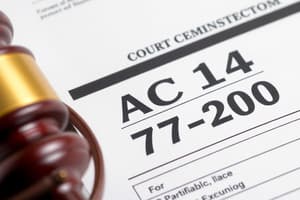Podcast
Questions and Answers
What limitation exists regarding attorney-client privilege in Japan for communications with in-house counsel?
What limitation exists regarding attorney-client privilege in Japan for communications with in-house counsel?
- Protection is extended to all documents regardless of ownership.
- No specific protection from disclosure exists for certain documents. (correct)
- Prima facie extension of privilege is granted to in-house counsel.
- General confidentiality protections provide absolute privilege.
What was the outcome of the French courts' decision regarding in-house counsel's internal communications in the Whirlpool case?
What was the outcome of the French courts' decision regarding in-house counsel's internal communications in the Whirlpool case?
- The court dismissed claims of privilege entirely.
- Only external communications had any chance of being privileged.
- All internal communications were regarded as non-privileged.
- Internal notes discussing external law firm advice were privileged. (correct)
In which of the following countries is there no concept of attorney-client privilege for in-house counsel?
In which of the following countries is there no concept of attorney-client privilege for in-house counsel?
- Japan
- South Korea
- France
- China (correct)
Which statement accurately reflects the legal framework in Japan regarding documents possessed by a client or third party?
Which statement accurately reflects the legal framework in Japan regarding documents possessed by a client or third party?
What crucial aspect regarding in-house counsel privilege is raised about jurisdictions like Japan?
What crucial aspect regarding in-house counsel privilege is raised about jurisdictions like Japan?
What distinguishes the authority of an arbitral tribunal from that of a judge in common law jurisdictions?
What distinguishes the authority of an arbitral tribunal from that of a judge in common law jurisdictions?
Which statement accurately reflects the difference in document production between common and civil law jurisdictions?
Which statement accurately reflects the difference in document production between common and civil law jurisdictions?
Under what condition can arbitrators render an award based on justice and appropriateness?
Under what condition can arbitrators render an award based on justice and appropriateness?
In a common law jurisdiction, what specific obligation does a party have regarding document production?
In a common law jurisdiction, what specific obligation does a party have regarding document production?
What is the primary reason that civil law jurisdictions do not have a disclosure or discovery process?
What is the primary reason that civil law jurisdictions do not have a disclosure or discovery process?
What must parties in common law jurisdictions do during the document discovery process?
What must parties in common law jurisdictions do during the document discovery process?
What distinguishes a Supreme Court's authority in Indonesia from that of arbitrators?
What distinguishes a Supreme Court's authority in Indonesia from that of arbitrators?
What is the primary purpose of discovery processes in common law systems?
What is the primary purpose of discovery processes in common law systems?
In civil law systems, who bears the burden of proof for their case?
In civil law systems, who bears the burden of proof for their case?
What is a notable limitation of the discovery process in Indonesian civil law?
What is a notable limitation of the discovery process in Indonesian civil law?
What is one goal of the disclosure process in litigation?
What is one goal of the disclosure process in litigation?
How does the concept of 'trial by ambush' relate to disclosure?
How does the concept of 'trial by ambush' relate to disclosure?
What distinguishes common law systems from civil law systems regarding evidence?
What distinguishes common law systems from civil law systems regarding evidence?
What is a characteristic feature of Indonesian civil procedure regarding evidence?
What is a characteristic feature of Indonesian civil procedure regarding evidence?
How do common law jurisdictions generally perceive the role of mutual knowledge in litigation?
How do common law jurisdictions generally perceive the role of mutual knowledge in litigation?
What is often a result of limited disclosure mechanisms in civil law jurisdictions?
What is often a result of limited disclosure mechanisms in civil law jurisdictions?
What must be proven for legal professional privilege to apply in Hong Kong when involving in-house counsel?
What must be proven for legal professional privilege to apply in Hong Kong when involving in-house counsel?
Which of the following is NOT a benchmark question to assess if advice from in-house counsel is privileged?
Which of the following is NOT a benchmark question to assess if advice from in-house counsel is privileged?
In Australia, what is the primary factor in determining the privilege of communications with in-house counsel?
In Australia, what is the primary factor in determining the privilege of communications with in-house counsel?
Which statement is TRUE regarding the legal privilege of in-house counsel in large MNCs?
Which statement is TRUE regarding the legal privilege of in-house counsel in large MNCs?
What additional requirement exists for legal advice to be protected by privilege?
What additional requirement exists for legal advice to be protected by privilege?
What distinguishes legal professional privilege in Hong Kong from other jurisdictions?
What distinguishes legal professional privilege in Hong Kong from other jurisdictions?
Which condition does NOT affect the privilege status of an in-house counsel's legal advice?
Which condition does NOT affect the privilege status of an in-house counsel's legal advice?
Which of the following is a clear legal position regarding in-house counsel around the world?
Which of the following is a clear legal position regarding in-house counsel around the world?
What is a key difference in how in-house counsel's privilege is treated in Australia compared to other regions?
What is a key difference in how in-house counsel's privilege is treated in Australia compared to other regions?
What is true about the obligation of legal privilege according to the content?
What is true about the obligation of legal privilege according to the content?
In which jurisdiction do House counsel not have the right to claim privilege over their work?
In which jurisdiction do House counsel not have the right to claim privilege over their work?
To whom does attorney-client privilege not apply in Thailand and Indonesia?
To whom does attorney-client privilege not apply in Thailand and Indonesia?
What exceptions exist related to the obligation of confidentiality?
What exceptions exist related to the obligation of confidentiality?
How has Singapore adjusted its legal framework regarding in-house counsel?
How has Singapore adjusted its legal framework regarding in-house counsel?
What characterizes in-house lawyers compared to advocates in the content provided?
What characterizes in-house lawyers compared to advocates in the content provided?
What is one significant limitation of the legal privilege in civil law systems compared to common law systems?
What is one significant limitation of the legal privilege in civil law systems compared to common law systems?
Which of the following is a factor in determining the applicability of privilege for in-house counsel in Singapore?
Which of the following is a factor in determining the applicability of privilege for in-house counsel in Singapore?
What obligation do advocates have concerning client information?
What obligation do advocates have concerning client information?
What does the term 'Advocate-client relationship' refer to?
What does the term 'Advocate-client relationship' refer to?
Flashcards
Secondary Remedy
Secondary Remedy
A remedy sought after a primary one has been unsuccessful or is considered insufficient.
Ex aequo et bono
Ex aequo et bono
Rendering an arbitral award based on what is fair and equitable, rather than solely on the law.
Arbitral Tribunal
Arbitral Tribunal
A panel of individuals chosen by parties who determine disputes according to guidelines.
Discovery in Common Law
Discovery in Common Law
Signup and view all the flashcards
Discovery in Civil Law
Discovery in Civil Law
Signup and view all the flashcards
Obligation to produce adverse documents
Obligation to produce adverse documents
Signup and view all the flashcards
Court-ordered document production
Court-ordered document production
Signup and view all the flashcards
Discovery Process in Common Law
Discovery Process in Common Law
Signup and view all the flashcards
Disclosure in Common Law
Disclosure in Common Law
Signup and view all the flashcards
Civil Law Discovery Limitations
Civil Law Discovery Limitations
Signup and view all the flashcards
Civil Law Evidence and Burden of Proof
Civil Law Evidence and Burden of Proof
Signup and view all the flashcards
Indonesian Civil Procedures
Indonesian Civil Procedures
Signup and view all the flashcards
Pre-trial Evidence Sharing in Indonesia
Pre-trial Evidence Sharing in Indonesia
Signup and view all the flashcards
Trial Evidence Submission in Indonesian Courts
Trial Evidence Submission in Indonesian Courts
Signup and view all the flashcards
Parties' Obligation Civil Law
Parties' Obligation Civil Law
Signup and view all the flashcards
Exchange of Written Witness Statements in Civil Law
Exchange of Written Witness Statements in Civil Law
Signup and view all the flashcards
Attorney-Client Privilege
Attorney-Client Privilege
Signup and view all the flashcards
In-House Counsel
In-House Counsel
Signup and view all the flashcards
Privilege Extension to In-House Counsel
Privilege Extension to In-House Counsel
Signup and view all the flashcards
Japanese Law on Privilege
Japanese Law on Privilege
Signup and view all the flashcards
France's Approach to Privilege
France's Approach to Privilege
Signup and view all the flashcards
Attorney-Client Privilege (Advocate)
Attorney-Client Privilege (Advocate)
Signup and view all the flashcards
Scope of Privilege (Civil Law)
Scope of Privilege (Civil Law)
Signup and view all the flashcards
In-House Counsel (Privilege)
In-House Counsel (Privilege)
Signup and view all the flashcards
Exceptions to Privilege
Exceptions to Privilege
Signup and view all the flashcards
Singapore Privilege
Singapore Privilege
Signup and view all the flashcards
Related Corporations (In-House)
Related Corporations (In-House)
Signup and view all the flashcards
Thailand & Indonesia (Privilege)
Thailand & Indonesia (Privilege)
Signup and view all the flashcards
Legal Privilege (APAC)
Legal Privilege (APAC)
Signup and view all the flashcards
Civil Law vs. Common Law
Civil Law vs. Common Law
Signup and view all the flashcards
In-house Counsel and Related Corporations
In-house Counsel and Related Corporations
Signup and view all the flashcards
Legal Professional Privilege for In-house Counsel
Legal Professional Privilege for In-house Counsel
Signup and view all the flashcards
Employment Relationship for Privilege
Employment Relationship for Privilege
Signup and view all the flashcards
Dominant Purpose for Legal Advice
Dominant Purpose for Legal Advice
Signup and view all the flashcards
Testing for Privilege (Hong Kong)
Testing for Privilege (Hong Kong)
Signup and view all the flashcards
Practicing Certificate for In-house Lawyers (Australia)
Practicing Certificate for In-house Lawyers (Australia)
Signup and view all the flashcards
In-house Counsel vs. External Lawyers
In-house Counsel vs. External Lawyers
Signup and view all the flashcards
Legal Professional Privilege: Core Concept
Legal Professional Privilege: Core Concept
Signup and view all the flashcards
Why is Legal Privilege Important?
Why is Legal Privilege Important?
Signup and view all the flashcards
Jurisdictional Differences in Privilege
Jurisdictional Differences in Privilege
Signup and view all the flashcards
Study Notes
Procedural Issues in Civil Law Jurisdictions
- Civil law jurisdictions differ in procedural issues compared to common law systems.
- Indonesia's court jurisdiction is based on absolute and relative competence.
- Absolute competence (jurisdiction) is based on the type of case (e.g., criminal, family, commercial).
- Relative competence (jurisdiction) depends on factors like location of parties or where a contract was signed.
Court Jurisdiction in Indonesia
- Courts in Indonesia have power to hear certain cases based on the type of case (absolute competence), or based on the location of the parties (relative competence).
- A court's authority to hear a specific type of case is determined by the subject matter and the nature of the legal matter or the type of relief sought.
- Criminal Court has authority over criminal cases; family court over family-related matters; and the Commercial Court over commercial matters.
- The relevant book on procedural issues in Indonesia, known as HHIR, has provisions in Article 118, subparagraph 1, on court jurisdiction.
- If the defendant's residence is unknown, the civil case can be initiated in the Central Jakarta District Court.
- A party can challenge that the correct court does not have the appropriate jurisdiction. Examples include land ownership disputes which are administrative state disputes.
Procedural Issues in Other Jurisdictions
- Disclosure or discovery processes aren't typical in civil law systems.
- Common law jurisdictions, like Singapore, allow parties to produce documents.
- Parties are obliged to produce documents relevant to their cases, including documents that might be adverse.
- Thailand has specialized courts for specific cases (e.g., labour disputes, intellectual property, commercial, tax issues).
- Parties in Thailand are expected to gather their evidence before trial.
Privilege in Different Legal Systems
- The legal concepts of privilege differ between common law and civil law systems.
- In civil law systems, the obligation to keep information confidential from clients is not time-limited, and it continues even after the relationship between an advocate and client ends.
- Advocates in civil law jurisdictions are obliged to maintain confidentiality of client information, but an in-house lawyer in a company isn't considered the same as an advocate, in that their employer (the company) is not their client.
- In civil law systems, privilege is limited according to the role of the in-house counsel in relation to the organization, and based on the need to prove the existence of an employment relationship between the in-house counsel and the employer, to ensure the facts are correct.
- In some countries, e.g., China, there is no privilege for in-house counsel (the advice they give isn't privileged).
- France has courts that consider some in-house counsel communications privileged.
- There are different exceptions to privilege depending on the jurisdiction, such as in case of financial crimes; terrorism, etc.
Important Concepts
- Ex aequo et bono: A legal principle allowing judges or arbitrators to consider fairness and equity as opposed to strictly enforcing law in legal matters.
- Territorial Jurisdiction: In principle, a country's courts have authority only within their borders.
Studying That Suits You
Use AI to generate personalized quizzes and flashcards to suit your learning preferences.




